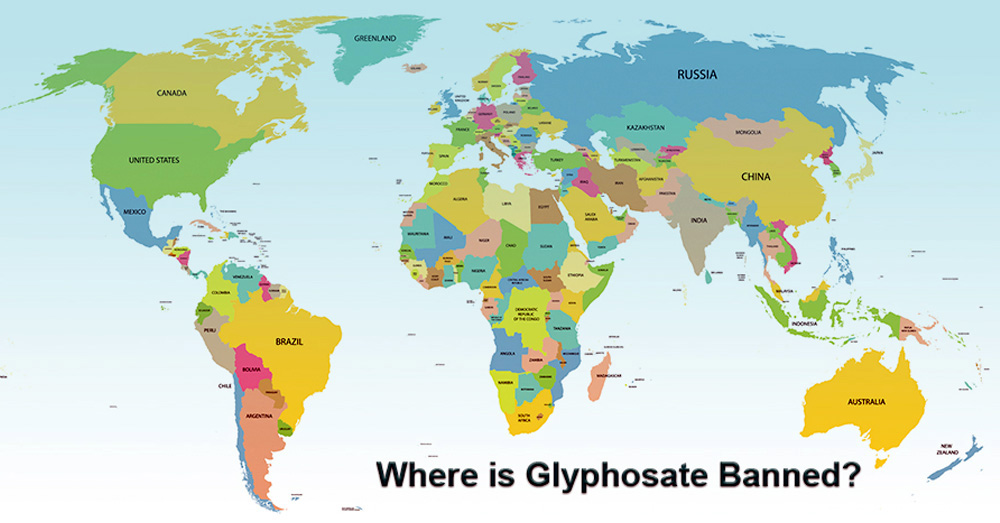
Germany + 13 Other Countries Say No to Glyphosate: What About the U.S.?
Germany’s agricultural minister, Julia Kloeckner, announced April 17 that she was finalizing a draft regulation to end the use of glyphosate, the world’s most heavily used herbicide in history. Glyphosate is the key active ingredient in Monsanto’s Roundup weedkiller.
April 26, 2018 | Source: Organic Consumers Association | by
Germany’s agricultural minister, Julia Kloeckner, announced April 17 that she was finalizing a draft regulation to end the use of glyphosate, the world’s most heavily used herbicide in history. Glyphosate is the key active ingredient in Monsanto’s Roundup weedkiller.
“I am planning a regulatory draft as a first building block in the strategy to minimize use of glyphosate,” Kloeckner said. Her plans include a ban on the weedkiller in household gardens, parks and sport facilities, and “massive restrictions” on its use in agriculture.
The move was welcomed by many German politicians, as it cements a previous agreement in February between members of Chancellor Angela Merkel’s Christian Democrats and the Social Democrats to significantly reduce, and ultimately ban, glyphosate-containing products.
Glyphosate, which was classified as “probably carcinogenic to humans” by the World Health Organization’s International Agency for Research on Cancer (IARC) in March 2015, is hotly contested in Europe.
If Germany passes this regulation, it will join many other countries that are saying no to glyphosate.
According to Baum, Hedlund, Aristei & Goldman, a U.S. law firm representing hundreds of plaintiffs suing Monsanto for allegedly causing their cancer, the following countries have banned or placed restrictions on the use of glyphosate:
• Belgium: In 2017, the Flemish government banned individual use of glyphosate and voted against reliciensing glyphosate in the EU. The country was one of six EU member states to sign a letter to the EU Commission calling for “an exit plan for glyphosate.”
• Bermuda: The island outlawed the private and commercial sale of all glyphosate-based herbicides.
• Colombia: In 2015, the country forbid the use of glyphosate to eliminate illegal plantations of coca, often used to make cocaine, due to concern that the herbicide causes cancer. However in 2017, the country reinstituted its controversial fumigation program. But instead of using aerial fumigation, glyphosate is now sprayed manually, from the ground.
• Netherlands: Dutch officials have banned all non-commercial use of glyphosate.
• Sri Lanka: In 2014, Sri Lankan President Mahinda Rajapaksa mandated an all-out ban on glyphosate, following a study linking Roundup to Fatal Chronic Kidney Disease (CKD), the second-leading cause of death among males in the country. Sri Lanka was the first country to issue a nationwide ban on glyphosate.
• El Salvador: Passed a law banning glyphosate, citing the same study linking fatal chronic kidney disease to Roundup.
• Middle Eastern countries, including Saudi Arabia, Kuwait, Qatar, Bahrain, Oman and the United Arab Emirates, have stopped glyphosate use.
• France: President Emmanuel Macron announced in Novemenber 2017, an outright ban on glyphosate, to take effect “within three years.”
So why hasn’t the U.S. banned glyphosate?
The U.S. Environmental Protection Agency (EPA) has been conducting its required 15-year re-registration review of glyphosate since 2009. The agency was supposed to re-approve or ban the chemical by the end of 2015. But after the IARC panel of 17 scientists unanimously agreed glyphosate was a probable human carcinogen, the EPA was forced to take its review of the chemical more seriously.
The EPA is seeking public input until April 30 on the health impacts of glyphosate. You can make your voice heard by clicking here.
As we wait for the federal government to act, at least the state of California has taken a bold step against the weedkiller. In July 2017, the state added glyphosate to its Proposition 65 list. Monsanto filed a lawsuit after the state announced its plan to list the chemical, but the agrochemical giant lost its appeal earlier this month after a California appellate court sided with the State of California and the Center for Food Safety saying glyphosate can be listed as a probable carcinogen under Proposition 65.
Several towns and cities in many states—including California, Colorado, Connecticut, Florida, Illinois, Maryland, Maine, Massachusetts, Minnesota, Nevada, New Mexico, New Jersey, New York, Ohio, Oregon and Virginia—have also stood their ground against the toxic chemical.
“For decades now, the public has been exposed, unknowingly and against their will, to glyphosate, despite mounting evidence that this key active ingredient in Monsanto’s Roundup herbicide is harmful to human health and the environment,” International Director of Organic Consumers Association Ronnie Cummins explained. “Now, is the time to increase pressure around the world and encourage more states, cities and countries to ban this toxic chemical.”
The Organic Consumers Association is a 501(c)(3) nonprofit public interest and consumer advocacy organization. Stay up-to-date with OCA’s news and alerts by signing up for our newsletter.
